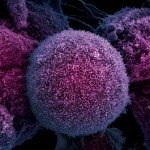Link to Pubmed [PMID] – 19330025
Oncogene 2009 Apr;28(16):1875-8
Ku70 forms a heterodimer with Ku80, called Ku that is well known for repairing DNA double-strand breaks through non-homologous end joining. As a result, deletion of either causes a very similar phenotype in mice that includes hypersensitivity to clastogens and early aging. In addition, deletion of Ku80 along with the cell cycle checkpoint protein, p53, dramatically increases the incidence of pro-B-cell lymphoma. Even though Ku70- p53-mutant mice have not been analysed, a logical assumption is they would exhibit the same cancer phenotype. Here, we test this assumption by comparing p53-mutant littermates deleted for either Ku70 or Ku80 or both. We find this assumption to be incorrect as p53-mutants live significantly longer when deleted for Ku70 rather than Ku80 or Ku70+Ku80. We also find the former cohort displays much lower levels of pro-B-cell lymphoma than the latter two cohorts. As pro-B-cell lymphoma is caused by a translocation between chromosomes 12 and 15, we tested fibroblasts for DNA repair capacity, and found that p53-mutant fibroblasts are more sensitive to streptonigrin and paraquat when deleted for Ku80 as compared with Ku70. Thus, Ku80 may function outside the Ku heterodimer to influence DNA damage repair presenting the possibility that Ku80 influenced the open coding ends in a manner that suppressed a cancer-causing translocation.

